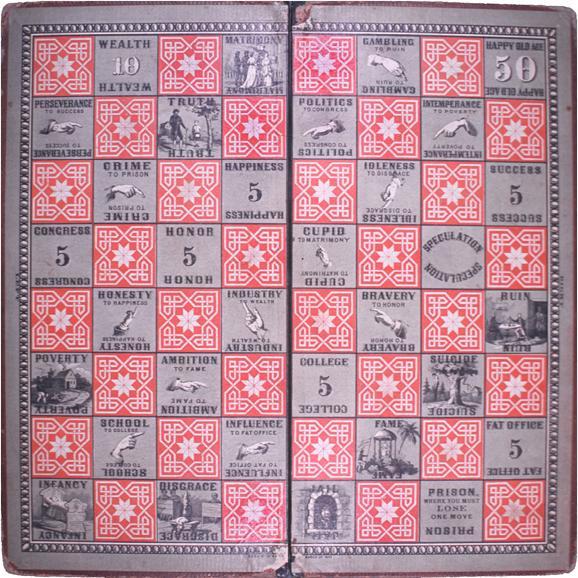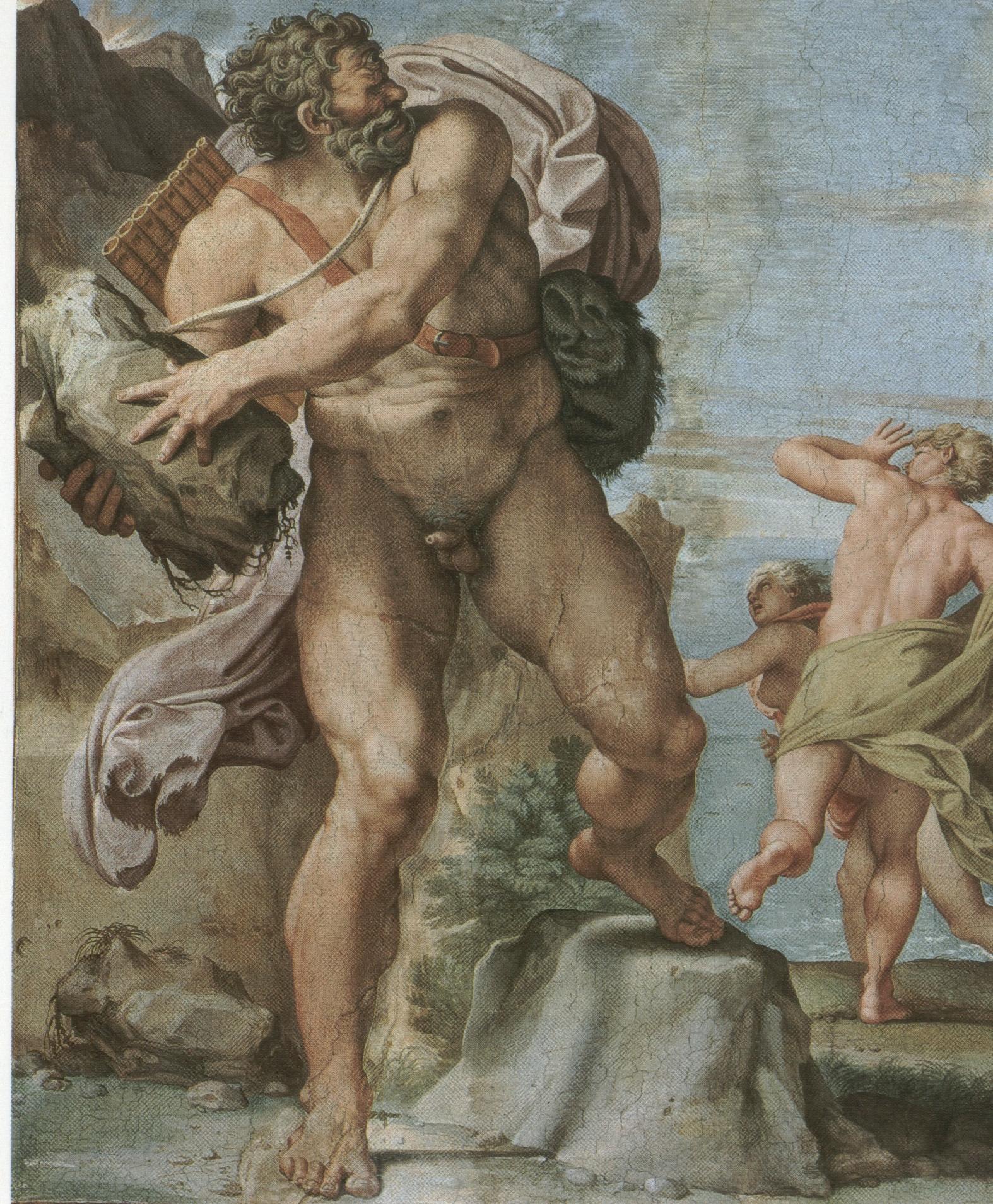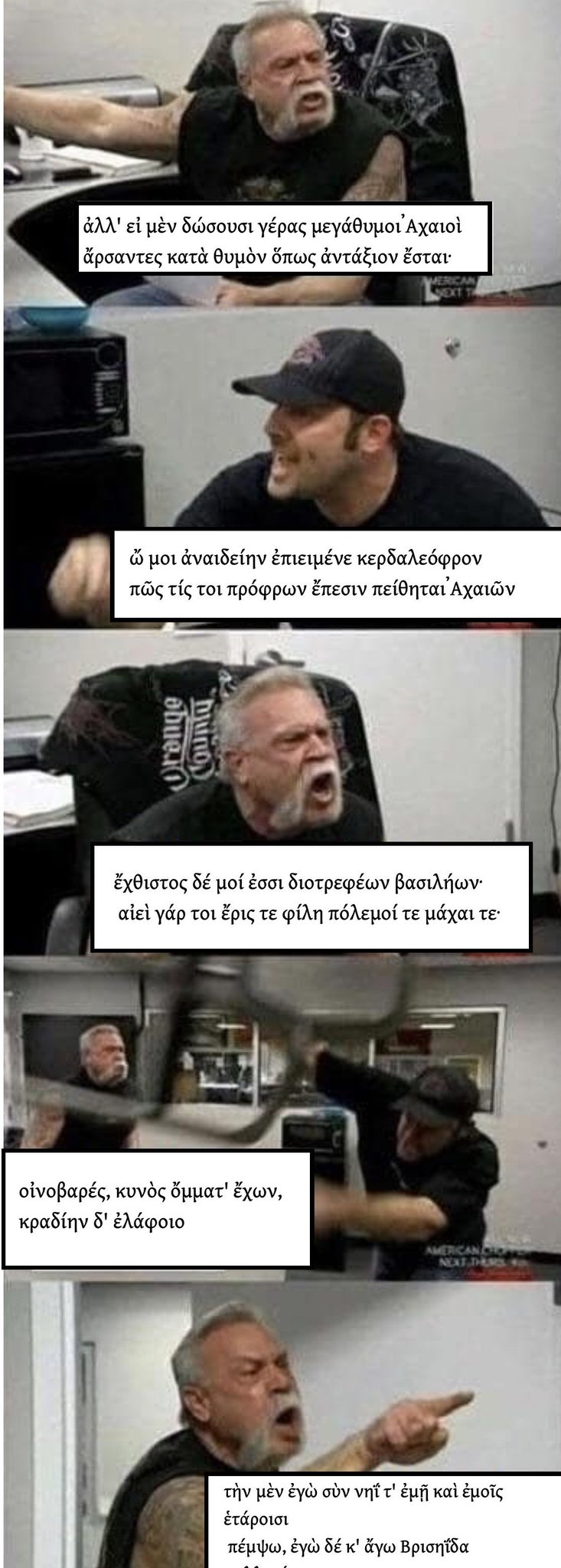Plutarch’s “Table-talk” stands alongside Athenaeus’ Deipnosophists and Petronius Satyricon as presenting a wide variety of fragments and subjects discussed within a somewhat fragile narrative frame. When compared to the other works, Plutarch’s seems to offer even less of an effort to unite the various topics as “Table-talk”. Over nine books, Plutarch presents 90 topics for discussion by a rotating case of characters (often including himself).
Below I have excerpted all of the questions without any of the answers. For a dinner party or get-together with classical or philosophical themes, or just any gathering you might fear will lack good cheer and exciting conversation, I suggest putting each question on a card and distributing them randomly for hilarity.
[PS: if you do this, take notes or record it and share it with the world]
Plutarch Table Talk, [Moralia]
1.1 [612] “Is it right to practice philosophy while drinking?
Εἰ δεῖ φιλοσοφεῖν παρὰ πότον
1.2 [615] “Should the host assign seats to his guests or should they arrange themselves?”
Πότερον αὐτὸν δεῖ κατακλίνειν τοὺς ἑστιωμένους τὸν ὑποδεχόμενον ἢ ἐπ᾿ αὐτοῖς ἐκείνοις ποιεῖσθαι;
1.3 [619] “Why the position called the ‘consul’s’ gained honor?”
Διὰ τί τῶν τόπων ὁ καλούμενος ὑπατικὸς ἔσχε τιμήν
1.4 [620] “What sort of person should be in charge of drinking?”
Ποῖόν τινα δεῖ τὸν συμποσίαρχον εἶναι;
1.5 [622] “Why do people say that “Love teaches the poet”?
Πῶς εἴρηται τὸ “ποιητὴν δ᾿ ἄρα Ἔρως διδάσκει”;
1.6 [623] “On Alexander the Great’s excessive drinking”
Περὶ τῆς Ἀλεξάνδρου πολυποσίας;
1.7 [625] “On why old men like strong drinks”
Διὰ τί μᾶλλον ἀκράτῳ χαίρουσιν οἱ γέροντες;
1.8 [625] “Why do the elderly have to read words from farther away?”
Διὰ τί τὰ γράμματα πόρρωθεν οἱ πρεσβύτεροι μᾶλλον ἀναγιγνώσκουσιν
1.9 [626] “Why are clothes washed with fresh water instead of salt water?”
Διὰ τί τῷ ποτίμῳ μᾶλλον ἢ τῷ θαλαττίῳ πλύνεται τὰ ἱμάτια
1.10 [628] “Why is any representative of the trivbe of Ajas never judged last in Athens?”
Διὰ τί τῆς Αἰαντίδος φυλῆς Ἀθήνησιν οὐδέποτε τὸν χορὸν ἔκρινον ὕστατον;
2.1 [629] What are the matters about which Xenophon says that people are pleased to be questioned and mocked about while drinking?”
Τίν᾿ ἐστὶν ἃ Ξενοφῶν παρὰ πότον ἥδιον ἐρωτᾶσθαί φησι καὶ σκώπτεσθαι ἢ μή;
2.2 [635] “Why do people get hungrier in the fall?”
Διὰ τί βρωτικώτεροι γίγνονται περὶ τὸ μετόπωρον;
2.3 [635] “Which came first, the hen or the egg?”
Πότερον ἡ ὄρνις πρότερον1 ἢ τὸ ᾠὸν ἐγένετο;
2.4 [638] “Is wrestling really the oldest sport?”
Εἰ πρεσβύτατον ἡ πάλη τῶν ἀγωνισμάτων;
2.5 [639] “Why does Homer always put the boxing first, following by wrestling and ending with racing in the athletic contests?”
Διὰ τί τῶν ἀθλημάτων Ὅμηρος πρῶτον ἀεὶ τάττει τὴν πυγμὴν εἶτα τὴν πάλην καὶ τελευταῖον τὸν δρόμον;
2.6 [640] “Why are pine and firm and similar plants not grafted?”
Διὰ τί πεύκη καὶ πίτυς καὶ τὰ ὅμοια τούτοις οὐκ ἐνοφθαλμίζεται;
2.7 [641] “Concerning the sucking-fish?”
Περὶ τῆς ἐχενηίδος
2.8 [641] “Why people say that horses who are bitten by wolves are temperamental”
Διὰ τί τοὺς λυκοσπάδας ἵππους θυμοειδεῖς εἶναι λέγουσιν
2.9 [642] “Why do sheep which are wolf-bitten have meat which is sweeter but wool which is covered in lice?”
Διὰ τί τὰ λυκόβρωτα τῶν προβάτων τὸ κρέας μὲν γλυκύτερον τὸ δ᾿ ἔριον φθειροποιὸν ἴσχει;
2.10 [642] “Did people in ancient days do better with their individual portions than people of today who dine from a shared plate?”
Πότερον οἱ παλαιοὶ βέλτιον ἐποίουν πρὸς μερίδας ἢ οἱ νῦν ἐκ κοινοῦ δειπνοῦντες;
3.1 [646A] “Should flower-garlands be used at Drinking parties?
Εἰ χρηστέον ἀνθίνοις στεφάνοις παρὰ πότον;
3.2 [648] Is the nature of ivy hot or cold?”
Περὶ τοῦ κιττοῦ πότερον τῇ φύσει θερμὸς ἢ ψυχρός ἐστιν
3.3 [650] “Why women are hardest to get drunk but old men easiest?”
Διὰ τί γυναῖκες ἥκιστα μεθύσκονται τάχιστα δ᾿ οἱ γέροντες
3.4 [650]“Are women colder in their mettle than men or hotter?”
Πότερον ψυχρότεραι τῇ κράσει τῶν ἀνδρῶν ἢ θερμότεραί εἰσιν αἱ γυναῖκες
3.5 [651] “Is wine more cold in is strength?”
Εἰ ψυχρότερος τῇ δυνάμει ὁ οἶνος
3.6 [653] “When is the right time for sex?”
Περὶ καιροῦ συνουσίας
3.7 [655] “Why does sweet wine intoxicate the least?”
Διὰ τί τὸ γλεῦκος ἥκιστα μεθύσκει
3.8 [653] “Why are very drunk less crazy than the merely tipsy?”
Διὰ τί τῶν ἀκροθωράκων λεγομένων οἱ σφόδρα μεθύοντες ἧττον παρακινητικοί εἰσιν;
3.9 [657] “On the proposal to “drink five or three not four”
Περὶ τοῦ “ἢ πέντε πίνειν ἢ τρί᾿ μὴ τέσσαρα”
3.10 “Why does meat rot more under the moon than the sun?”
Διὰ τί τὰ κρέα σήπεται μᾶλλον ὑπὸ τὴν σελήνην ἢ τὸν ἥλιον;
4.1 [660] “Is a variety of food easier to digest than simple fare?”
Εἰ ἡ ποικίλη τροφὴ τῆς ἁπλῆς εὐπεπτοτέρα;
4.2 [664] “Why do truffles seem to be created by thunder and why do people think that lightning never strikes sleeping people?”
Διὰ τί τὰ ὕδνα δοκεῖ τῇ βροντῇ γίνεσθαι, καὶ διὰ τί τοὺς καθεύδοντας οἴονται μὴ κεραυνοῦσθαι;
4.2 [666] “Why do people invite as many as possible to wedding meals?”
Διὰ τί πλείστους ἐν γάμοις ἐπὶ δεῖπνον καλοῦσιν;
4.4 [667] “Is the sea more full of delicacies than the land?”
Εἰ ἡ θάλασσα τῆς γῆς εὐοψοτέρα;
4.5 [669] “Do Jews avoid the meat because they revere or despise pork?”
Πότερον οἱ Ἰουδαῖοι σεβόμενοι τὴν ὗν ἢ δυσχεραίνοντες ἀπέχονται τῶν κρεῶν;
4.6 [671] “Who is the Jews’ god?”
Τίς ὁ παρ᾿ Ἰουδαίοις θεός;
4.7 [672] “Why are days named for the planets arranged in an order different from the planets’ order? And, on the position of the sun?”
Διὰ τί τὰς ὁμωνύμους τοῖς πλάνησιν ἡμέρας οὐ κατὰ τὴν ἐκείνων τάξιν ἀλλ᾿ ἐνηλλαγμένως ἀριθμοῦσιν· ἐν ᾧ καὶ περὶ ἡλίου τάξεως
4.8 “Why do people carry seal rings on the finger next to the middle finger?”
Διὰ τί τῶν δακτύλων μάλιστα τῷ παραμέσῳ σφραγῖδας φοροῦσιν
4.9 “Is it more appropriate to wear images of gods or wise men on seal rings?”
Εἰ δεῖ θεῶν εἰκόνας ἐν ταῖς σφραγῖσιν ἢ σοφῶν ἀνδρῶν φορεῖν
4.10 “Why don’t women eat lettuce hearts?”
Διὰ τί τὸ μέσον τῆς θρίδακος αἱ γυναῖκες οὐ τρώγουσιν
5.1 [673] “Why do we feel pleasure hearing people act like they are angry and sad but displeasure when people are actually feeling these things?”
Διὰ τί τῶν μιμουμένων τοὺς ὀργιζομένους καὶ λυπουμένους ἡδέως ἀκούομεν, αὐτῶν δὲ τῶν ἐν τοῖς πάθεσιν ὄντων ἀηδῶς;
5.2 [674] “Was the poetic competition truly ancient?”
Ὅτι παλαιὸν ἦν ἀγώνισμα τὸ τῆς ποιητικῆς;
5.3 “For what reason was the pine considered sacred to Poseidon and Dionysus?
Τίς αἰτία δι᾿ ἣν ἡ πίτυς ἱερὰ Ποσειδῶνος ἐνομίσθη καὶ Διονύσου;
5.4 [677] “What do we think about the Homeric phrase “mix the wine stronger?”
Περὶ τοῦ “ζωρότερον δὲ κέραιε”;
5.5 [678]“What do we think of those who invite many to dinner?”
Περὶ τῶν πολλοὺς ἐπὶ δεῖπνον καλούντων;
5.6 [679] “What’s the reason there is not enough space for diners at the beginning of a meal but plenty later?”
Τίς αἰτία τῆς ἐν ἀρχῇ στενοχωρίας τῶν δειπνούντων εἶθ᾿ ὕστερον εὐρυχωρίας;
5.7 [680] “What do we think of those who cast a spell and have an evil eye?”
Περὶ τῶν καταβασκαίνειν λεγομένων καὶ βάσκανον ἔχειν ὀφθαλμὸν
5.8 [683] “Why does Homer call an apple tree “splendid in fruit while Empedocles calls apples hyperphloia?”
Διὰ τί τὴν μηλέαν “ἀγλαόκαρπον” ὁ ποιητὴς εἶπεν, Ἐμπεδοκλῆς δ᾿ “ὑπέρφλοια” τὰ μῆλα;
5.9 [684] “What’s the reason that the fig tree produces the sweetest fruit even though it is the most bitter tree?”
Τίς ἡ αἰτία, δι᾿ ἣν ἡ συκῆ δριμύτατον οὖσα δένδρον γλυκύτατον παρέχει τὸν καρπόν
5.10 [684] “Who are ‘salt and bean’ friends and, in connection, why does Homer call salt holy?”
Τίνες οἱ περὶ ἄλα καὶ κύαμον· ἐν ᾧ καὶ διὰ τί τὸν ἅλα “θεῖον” ὁ ποιητὴς εἶπεν;
6.1 [686] “What is the reason those who are fast are thirstier than they are hungry?”
Τίς ἡ αἰτία, δι᾿ ἣν οἱ νηστεύοντες διψῶσι μᾶλλον ἢ πεινῶσιν;
6.2 [687] “Are hunger and thirst caused by something missing or by a transformation of passages?”
Πότερον ἔνδεια ποιεῖ τὸ πεινῆν καὶ διψῆν ἢ πόρων μετασχηματισμός;
6.3 [689] “Why people stop being hungry if they drink but they get thirstier when they eat?”
Διὰ τί πεινῶντες μέν, ἐὰν πίωσι, παύονται, διψῶντες δ᾿, ἐὰν φάγωσιν, ἐπιτείνονται;
6.4 [689] “What is the reason that water which is drawn from awell gets cooler if remains in the air of the well over night?”
Διὰ τίν᾿ αἰτίαν τὸ φρεατιαῖον ὕδωρ ἀρυσθέν, ἐὰν ἐν αὐτῷ τῷ τοῦ φρέατος ἀέρι νυκτερεύσῃ, ψυχρότερον γίνεται
6.5 [690] “What is the reason that pebbles and bits of led thrown into water make it colder?”
Διὰ τίν᾿ αἰτίαν οἱ χάλικες καὶ αἱ μολιβδίδες ἐμβαλλόμεναι ψυχρότερον τὸ ὕδωρ ποιοῦσιν;
6.6 [691] “Why do people preserve snow with a covering of straw and cloths?”
Διὰ τίν᾿ αἰτίαν ἀχύροις καὶ ἱματίοις τὴν χιόνα διαφυλάττουσι;
6.7 [692] “Is it necessary to strain wine or not?”
Εἰ δεῖ τὸν οἶνον ἐνδιηθεῖν;
6.8 [693] “What is the cause of bulimia?”
Τίς αἰτία βουλίμου;
6.9 [694] “Why does Homer use particular epithets for other liquids while he only calls olive oil liquid?”
Διὰ τί ὁ ποιητὴς ἐπὶ μὲν τῶν ἄλλων ὑγρῶν τοῖς ἰδίοις ἐπιθέτοις χρῆται, μόνον δὲ τὸ ἔλαιον ὑγρὸν καλεῖ;
6.10 [696] “what is the reason that sacrificial meat becomes more tender when it is suspended on a fig tree?”
Τίς αἰτία, δι᾿ ἣν ψαθυρὰ γίνεται ταχὺ τὰ ἐκ συκῆς κρεμαννύμενα τῶν ἱερείων;
7.1 [698] “Against those who attack Plato because he says that drink goes through the lungs?”
Πρὸς τοὺς ἐγκαλοῦντας Πλάτωνι τὸ ποτὸν εἰπόντι διὰ τοῦ πλεύμονος ἐξιέναι;
7.2 [700] “Who is the “hornstruck” man according to Plato and why are seeds that fall on the horns of cattle harder?”
Τίς ὁ παρὰ τῷ Πλάτωνι κερασβόλος, καὶ διὰ τί τῶν σπερμάτων ἀτεράμονα γίγνεται τὰ προσπίπτοντα τοῖς κέρασι τῶν βοῶν;
7.3 [701] “What is the reason that the middle of wine is best, while olive oil is better at the top and honey is better near the bottom?”
Διὰ τί τοῦ μὲν οἴνου τὸ μέσον, τοῦ δ᾿ ἐλαίου τὸ ἐπάνω, τοῦ δὲ μέλιτος τὸ κάτω γίνεται βέλτιον;
7.4 [702] “Why did ancient Romans forbid that an empty table be removed or that a lamp be extinguished?”
Διὰ τί τοῖς πάλαι Ῥωμαίοις ἔθος ἦν μήτε τράπεζαν αἰρομένην περιορᾶν κενὴν μήτε λύχνον σβεννύμενον;
7.5 [703] “Is it the case that it is necessary to guard against the pleasures of degenerate music and how one must do it?”
Ὅτι δεῖ μάλιστα τὰς διὰ τῆς κακομουσίας ἡδονὰς φυλάττεσθαι, καὶ πῶς φυλακτέον;
7.6 [706] “A question about so-called “shadows” and if it is right to go to one person’s dinner at the invitation of others and when this is right and what kinds of hosts it is right for.”
Περὶ τῶν λεγομένων σκιῶν, καὶ εἰ δεῖ βαδίζειν καλούμενον πρὸς ἑτέρους ὑφ᾿ ἑτέρων ἐπὶ δεῖπνον, καὶ πότε, καὶ παρὰ τίνας;
7.7 [710] “is the music of flute girls right while drinking?
Εἰ δεῖ παρὰ πότον αὐλητρίσι χρῆσθαι;
7.8 [712] “What is the best entertainment at dinner?”
Τίσι μάλιστα χρηστέον ἀκροάμασι παρὰ δεῖπνον;
7.9 [714] “is it true that taking council on public affairs while drinking is no less Greek than Persian?”
Ὄτι βουλεύεσθαι παρὰ πότον οὐχ ἧττον ἦν Ἑλληνικὸν ἢ Περσικόν
7.10 [714] “Do those who deliberate while drinking do it well?”
Εἰ καλῶς ἐποίουν βουλευόμενοι παρὰ πότον;
8.1 [717] “About the days on which famous people were born and, in addition on births alleged from divine parents”
Περὶ ἡμερῶν ἐν αἷς γεγόνασί τινες τῶν ἐπιφανῶν· ἐν ᾧ καὶ περὶ τῆς λεγομένης ἐκ θεῶν γενέσεως
8.2 [718] “How did Plato mean that god was always doing geometry.”
Πῶς Πλάτων ἔλεγε τὸν θεὸν ἀεὶ γεωμετρεῖν;
8.3 [720] “Why is night more echoic than the day.”
Διὰ τί τῆς ἡμέρας ἠχωδεστέρα ἡ νύξ;
8.4 [724] “What’s the reason that different athletic competitions have different wreaths but all if them have the palm-frond. Also, why do people call large dates Nicolauses”
Διὰ τί τῶν ἱερῶν ἀγώνων ἄλλος ἄλλον ἔχει στέφανον, τὸν δὲ φοίνικα πάντες· ἐν ᾧ καὶ διὰ τί τὰς μεγάλας φοινικοβαλάνους Νικολάους καλοῦσιν;
8.5 [725] “Why do those who sail take water from the Nile before day?”
Διὰ τί πρὸ ἡμέρας ἐκ τοῦ Νείλου οἱ πλέοντες ὑδρεύονται;
8.6 [725] “Concerning people who come late to dinner. In addition, where the term akratisma [“breakfast”] and ariston [“lunch/breakfast”] and deipnon [“dinner”]
Περὶ τῶν ὀψὲ παραγινομένων ἐπὶ τὸ δεῖπνον· ἐν ᾧ καὶ πόθεν ἀκράτισμα καὶ ἄριστον καὶ δεῖπον ὠνομάσθη;
8.7 [727] “Concerning the Pythagorean injunction against inviting a swallow into the home and not to shake out the bedclothes right after rising.”
Περὶ συμβόλων Πυθαγορικῶν, ἐν οἷς παρεκελεύοντο χελιδόνα οἰκίᾳ. μὴ δέχεσθαι καὶ τὰ στρώματα συνταράττειν εὐθὺς ἀναστάντας
8.8 [728] “What’s the reason that Pythagoreans resist eating fish more than any other creature.”
Διὰ τί μάλιστα οἱ Πυθαγορικοὶ ἐμψύχων τοὺς ἰχθῦς παρῃτοῦντο;
8.9 [731] “Is it possible for new diseases to develop and what are their causes?”
Εἰ δυνατόν ἐστι συστῆναι νοσήματα καινὰ καὶ δι᾿ ἃς αἰτίας;
8.10 [734] “Why do we believe our dreams least in the autumn?”
Διὰ τί τοῖς φθινοπωρινοῖς ἐνυπνίοις ἥκιστα πιστεύομεν;
9.1 [736] “On timely and untimely quotations”
Περὶ στίχων εὐκαίρως ἀναπεφωνημένων καὶ ἀκαίρως;
9.2 [737] “Why is it that alpha is the first letter in the alphabet?”
Τίς αἰτία, δι᾿ ἣν τὸ ἄλφα προτέτακται τῶν στοιχείων;
9.3 [738] “What is the numerical relationship between vowels and semi-vowels?”
Κατὰ ποίαν ἀναλογίαν ὁ τῶν φωνηέντων καὶ ἡμιφώνων ἀριθμὸς συντέτακται;
9.4 [739] “Which of Aphrodite’s hands did Diomedes wound?”
Ποτέραν χεῖρα τῆς Ἀφροδίτης ἔτρωσεν ὁ Διομήδης;
9.5 “Why did Plato claim that Ajax’s soul was the twentieth to come to the drawing of lots?”
Διὰ τί Πλάτων εἰκοστὴν ἔφη τὴν Αἴαντος ψυχὴν ἐπὶ τὸν κλῆρον ἐκθεῖν;
9.6 [740] “What secret meaning does the tale of Poseidon’s defeat have? Also, why did the Athenians skip the second day of the month of Boedromion?”
Τί αἰνίττεται ὁ περὶ τῆς ἥττης τοῦ Ποσειδῶνος μῦθος; ἐν ᾧ καὶ διὰ τί τὴν δευτέραν Ἀθηναῖοι τοῦ Βοηδρομιῶνος ἐξαιροῦσιν;
9.7 [741] “What’s the cause for the division of melodies into a triad?”
Τίς αἰτία τῆς εἰς τριάδα διαιρέσεως τῶν μελῶν;
9.8 [741] “What difference is there between consonant and melodic intervals?”
Τίνι διαφέρει τὰ ἐμμελῆ διαστήματα τῶν συμφώνων;
9.9 [741] “What causes consonance? Also, why, when consonant notes are sounded, does the melody follow the one with lower pitch?”
Τίς αἰτία συμφωνήσεως; ἐν ᾧ καὶ διὰ τί, τῶν συμφώνων ὁμοῦκρουομένων, τοῦ βαρυτέρου γίνεται τὸ μέλος;
9.10 “What’s the reason that, when the sun and moon have equal ecliptic periods, the moon seems to enter into eclipse more often than the sun?”
Διὰ τί, τῶν ἐκλειπτικῶν περιόδων ἡλίου καὶ σελήνης ἰσαρίθμων οὐσῶν,3 ἡ σελήνη φαίνεται πλεονάκις ἐκλείπουσα τοῦ ἡλίου;
I swear, this idea could make me a million dollars.

Like this:
Like Loading...










